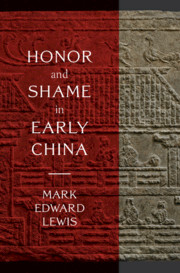Book contents
- Honor and Shame in Early China
- Honor and Shame in Early China
- Copyright page
- Contents
- Acknowledgments
- Introduction
- 1 Honor and Shame of the King and the Warrior
- 2 Acquired Honor in the Warring States
- 3 State-Based Honor in the Warring States
- 4 Honor of the Imperial Officials
- 5 Honor in Local Society in the Early Empires
- 6 Honor and Shame of Writers and Partisans
- Conclusion
- Works Cited
- Index
4 - Honor of the Imperial Officials
Published online by Cambridge University Press: 13 November 2020
- Honor and Shame in Early China
- Honor and Shame in Early China
- Copyright page
- Contents
- Acknowledgments
- Introduction
- 1 Honor and Shame of the King and the Warrior
- 2 Acquired Honor in the Warring States
- 3 State-Based Honor in the Warring States
- 4 Honor of the Imperial Officials
- 5 Honor in Local Society in the Early Empires
- 6 Honor and Shame of Writers and Partisans
- Conclusion
- Works Cited
- Index
Summary
This chapter examines the impact of the emergence of a unified empire on the ideas about honor and shame that defined the social elite that filled state offices, and distinguished them from elite competitors. First, scholars redefined the relation between the ruler and his officials, trying to forge them into a united body where the honor of each party depended on the honor of the other. Second, people increasingly granted status to several forms of intellectual expertise. Masters of the classical language received positions and increasing prestige for their skills. Similarly, titularly low officials who mastered legal texts secured considerable power, and claimed a higher status. Finally, Sima Qian claimed the right, patterned on Confucius, to pass judgments that honored or shamed those about whom he wrote. This developed the tension between scholars and the ruler that had emerged in the Warring States. The chapter also examines how the increasing merger of intellectuals and powerful families was reflected in tensions between the claims of scholarship and careers, and devotion to the family. Han authors carried forward the Warring States discourse distinguishing a true elite that worked for honor or morality, while rejecting conventional devotion to material wealth.
- Type
- Chapter
- Information
- Honor and Shame in Early China , pp. 124 - 156Publisher: Cambridge University PressPrint publication year: 2020

